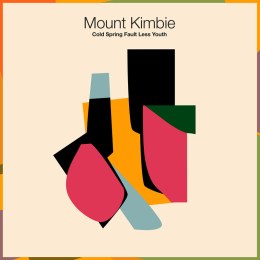
![]()
This post is in partnership with Consequence of Sound, an online music publication devoted to the ever growing and always thriving worldwide music scene.
By the time Mount Kimbie released their debut album Crooks & Lovers in 2010, dubstep had already bounced off happily to the mainstream. The record’s light steps and airy voicing led at least one critic to cough up the term “post-dubstep” for the first time, but really the British duo were coursing down a vein that already ran parallel to the cartoon bass drops that were starting to fill amphitheaters and SUVs. If Dominic Maker and Kai Campos make post-dubstep, then post-dubstep was born around the same time as dubstep — with Four Tet’s knotted beats, Prefuse 73′s detuned smears, and Boards of Canada’s chilly star maps. Mount Kimbie share more with their IDM ancestors than they do with Burial or James Blake. On Cold Spring Fault Less Youth, the duo worry even less about boundaries, focusing on how genres intersect and the meaning that can be derived from their collision.
Mount Kimbie faced the crisis of confidence that plagues many artists who aren’t content to use their second record to reiterate the strengths of their first. After stagnating for months, Campos and Maker pushed through the block with “Break Well”, a warm track built by manually recording arpeggios to tape. The tedium of the process was the inspiration they needed; when choices can be made with a click, grappling with physical obstacles can carve form out of infinite possibility. The record wears the warm and the real all over. If Kimbie are still responding to EDM, they’re not countering its volume but its emptiness.
Many songs feature lyrics for the first time. Canned vocals leaked into Crooks & Lovers, but Kimbie chopped them up and scattered them with the bewildered humor that still filters in and out of bedroom electro records. On Cold Spring, Mount Kimbie lets voices speak. The air clears and language emerges. Two tracks—among the record’s strongest—feature guest vocals from 19-year-old rapper King Krule.
Krule raps, or maybe it’s more like singing at times, but these songs aren’t hip-hop. Mount Kimbie invite him in for the pained edges of his voice, for the way he can snap from lethargy to honed anger in a second. While recording vocals for “You Took Your Time”, Maker and Campos found that they could push Krule to a more aggressive delivery by playing live drums in the room while he rapped. The drums didn’t make the final mix, but the vocal did — big, raw, lashing at some invisible threat.
Campos sings too — over the nervous trampler “Blood and Form”, on the easy-burning “Home Recording”, on the peak of “Made To Stray”. His vocals are more benign, but they scratch against their surroundings. Mount Kimbie wouldn’t loop an anthem-ready vocal into anything but an itchy mix, hot with bass and sax and beats that sound like they’re about to slide off the face of the planet.
Cold Spring lives on contrast, on stitching together mismatched parts into living mutants. It’s less whole than Crooks & Lovers, less content with the lines drawn around it. ”Slow” howls in like a Crystal Castles demo—and then a saloon organ chirps. ”Lie Near” marries a queasy Boards of Canada synth line with the roar of some far-off sax. The beat at the front of the mix stutters like a corroded engine gasping to start. We’re in one of those nightmares where we have to run from something we can’t see with legs that don’t work.
(MORE: A Conversation with Daft Punk)
King Krule isn’t just here for the human tones he lends to Kimbie’s patchworks. He articulates the fears that course through Cold Spring. Drone strikes and bone piles litter the lyrics to “You Took Your Time”. On “Meter, Pale, Tone”, he sings, “See me? I don’t exist/ You’ve won.” We’re starting to live in a time where humans can be deleted like bad tracks in Live. Mount Kimbie retreat to outdated methods of music-making in order to address the anxiety around technology that’s swelling fast and unchecked—and maybe in the wrong hands.
Like many transition records, Cold Spring at times feels half-evolved. “Sullen Ground” and “Made To Stray” build slow tension in a record that depends on it, but hug a little close to Kimbie’s old footprints. They’re moody, but still bubble with the grooves that drove Crooks & Lovers. These aren’t quite weak points so much as they are blind spots. Cold Spring finds Mount Kimbie ducking around a corner with a flashlight, throwing spots on where they’re going next.
Where they’re going next seems ripe if Mount Kimbie follow up on their intentions to continue collaborating with King Krule. ”He’s the most exciting person making music that we know,” said Campos in a recent interview. He’s led them to frightening places already—away from form for form’s sake, into spaces where form can be used to threaten, unravel, unnerve. On Crooks & Lovers, Mount Kimbie got good at playing. Now they’re saying something.
Essential Tracks: “You Took Your Time”, “Lie Near”
More from Consequence of Sound: The National: A New York Institution
